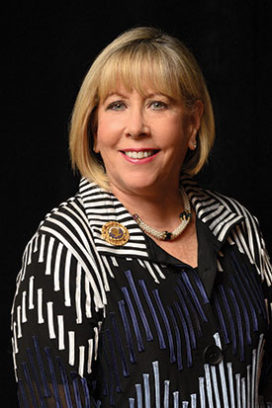Hadassah
President's Column
Our Zeal to Survive

Shakespeare achieved critical success from a winter of discontent, so imagine the literature that will emerge from a year of plague that touched the entire world. In addition to the coronavirus and the economic turmoil that came in its wake, the United States has seen dramatic surges of hurricanes, wildfires, political polarization and the exposure of raw racism.
If in January 2020 we had little idea of what we were about to face, the fog of January 2021 is equally opaque. We want to hope, but do we dare?
I say yes, and this is based not on wishful thinking but on the evidence of what we have seen and learned over the past 12 months, plus the innate tenacity of a people who rebuilt a homeland after 2,000 years of exile. Last year was hard, especially considering the loved ones we lost. And yet we keep moving forward.
More than any other people, we know that a crisis forces us to think. We think, therefore we act. We live by secular and Jewish calendars designed to remind us of both our worst trials and our capacity to shape the future.
Perhaps more than anything else, our long viral winter should remind us that existential challenges to our entire planet demand that nations work together.
Most of the world has adapted to the demands of the age, wearing masks, maintaining social distance and learning to defer not only the gratification of indoor concerts, restaurants and air travel, but even hugging those dearest to us whenever we might like—all to protect others at least as much as we protect ourselves. We have mastered new communication skills like Zoom and kept in touch with friends and family, in some cases with greater frequency than before.
When I became Hadassah’s national president last January, I could not have imagined the pivoting and adapting we would be called on to undertake within a few weeks, let alone how naturally and completely our organization would march into the effort. In response to lockdowns and social distancing that kept us from meeting in person, many of us have become more involved than ever online, educating ourselves, exercising, cooking, experimenting, alleviating stress and reaching out to help others.
Even as we spend more time than ever at home, all of us are part of the battle against the worst public health crisis in a century. Hadassah Medical Organization’s response to Covid-19—what it has done and what it continues to do—will become part of the Hadassah legend. From serving as Israel’s leading center for coronavirus treatment to innovative testing that allowed us to dramatically increase capacity and lower costs to our role in developing therapies and participating in the development of a vaccine, we have been true to our values and honored the legacy of the generations that went before us.
In a year of relentlessly gloomy news, there have been bright spots. Lockdowns showed us what a cleaner environment looks like. Airbus, the European aerospace leader, recently unveiled designs for the first zero-emission commercial aircraft.
Alongside the evidence that philanthropy increased even while economies declined, there have been numerous examples of generosity from ordinary people. Indeed, Philanthropy.com reported that charitable giving in the United States rose by almost 20 percent in the first half of 2020, driven mostly by donations under $250. And on the diplomatic front, Israel entered a new era by normalizing relations with the United Arab Emirates, Bahrain and Sudan.
Perhaps more than anything else, our long viral winter should remind us that existential challenges to our entire planet demand that nations work together. As we usher in Tu B’Shevat, the Jewish arboreal new year that this year begins the evening of January 27, I am encouraged that humanity’s zeal to survive and overcome one threat will be ploughed into other campaigns to heal the world.
May our insistence on hope bear fruit far and wide.










 Facebook
Facebook Instagram
Instagram Twitter
Twitter
Leave a Reply